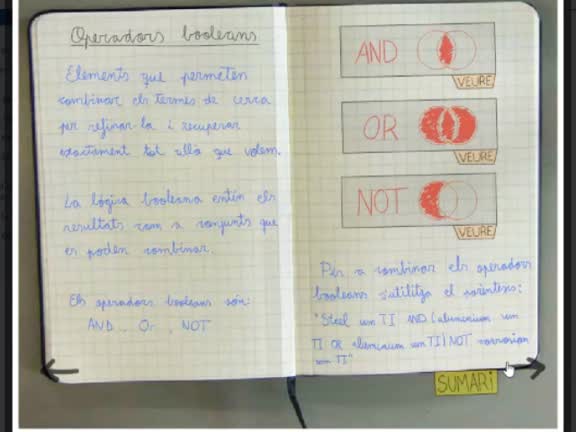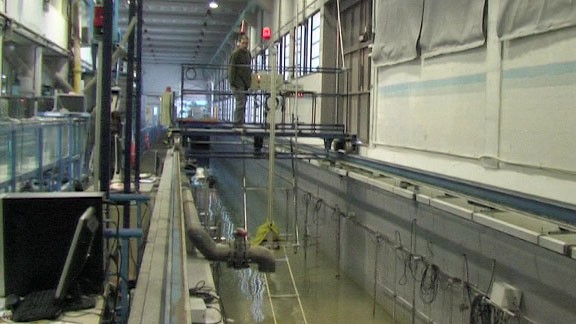Objectes multimèdia amb l’etiqueta: Serveis
Resultats de la cerca
Lliçó inaugural del curs 2013-2014
Accés obert
1 d’oct. 2013
El professor Carlos Ferrater Lambarri, catedràtic del Departament de Projectes Arquitectònics de l’Escola Tècnica Superior d’Arquitectura de Barcelona de la UPC, va impartir la lliçó inaugural del curs acadèmic 2013-2014 'Enginyeria i Arquitectura', durant la qual va emfatitzar sobre "l'apassionant i fructífera relació entre els arquitectes i els enginyers" i va voler així desvetllar “la falsedat de la pretesa contraposició” entre ambdues professions.
L'estratègia de cerca
Accés obert
30 de set. 2013
En aquest tutorial aprendràs a construir estratègies per obtenir millors resultats en les teves cerques d'informació
L'aqüicultura, un sector emergent
Accés obert
24 d’abr. 2013
L’aqüicultura és el cultiu d’organismes aquàtics, incloent peixos, crustacis, mol·luscs i plantes aquàtiques. El cultiu implica la intervenció de l’home en el procés de cria per augmentar la producció, en operacions com la sembra, l’alimentació, etc.
L’aqüicultura és el sector de producció d’aliments que està creixent més ràpidament segons l’Organització de les Nacions Unides per a l’Agricultura i l’Alimentació (FAO). A Catalunya la cria de peix representa una part molt petita de la indústria pesquera catalana, però com és la convivència entre pescadors i el sector aqüícola? Quins avantatges aporta l’aqüicultura? Trobem les claus d’aquesta convivència i els reptes de futur del sector en aquest vídeo.
L’aqüicultura és el sector de producció d’aliments que està creixent més ràpidament segons l’Organització de les Nacions Unides per a l’Agricultura i l’Alimentació (FAO). A Catalunya la cria de peix representa una part molt petita de la indústria pesquera catalana, però com és la convivència entre pescadors i el sector aqüícola? Quins avantatges aporta l’aqüicultura? Trobem les claus d’aquesta convivència i els reptes de futur del sector en aquest vídeo.
Recerca en aqüicultura
Accés obert
24 d’abr. 2013
La recerca en els àmbits de la qualitat i la seguretat alimentària en productes del mar és un dels factors claus per al desenvolupament de l’aqüicultura. A Catalunya, la Xarxa de Referència de Recerca i Desenvolupament i Innovació en Aqüicultura (XRAq) és una entitat creada per la Generalitat de Catalunya que té com a objectiu promoure la recerca interdisciplinària en l’àmbit de l’aqüicultura.
Un dels grups de recerca que forma part d'aquesta xarxa és el grup d’Aqüicultura i Qualitat dels Productes Aquàtics (AQUAL) de la UPC, que orienta la seva activitat en el disseny de sistemes d’aqüicultura per al benestar animal i la sostenibilitat ambiental i en projectes de recerca amb empreses.
Un dels grups de recerca que forma part d'aquesta xarxa és el grup d’Aqüicultura i Qualitat dels Productes Aquàtics (AQUAL) de la UPC, que orienta la seva activitat en el disseny de sistemes d’aqüicultura per al benestar animal i la sostenibilitat ambiental i en projectes de recerca amb empreses.
Espècies aqüícoles a Espanya
Accés obert
23 d’abr. 2013
El musclo gallec és el producte d'aqüicultura més conegut d’Espanya, i
aglutina el 70% de la producció nacional, però no és l’únic. Espècies com
l'orada, el llobarro o el turbot es conreen en instal·lacions aqüícoles del
nostre país.
La situació geogràfica d’Espanya, l’abundància de costes i la riquesa de les
seves aigües afavoreixen una gran varietat de zones per a la cria d’espècies,
tal i com ens explica en aquest vídeo **Lourdes Reig** , investigadora del
[Departament d'Enginyeria Agroalimentària i Biotecnologia
](http://deab.upc.edu/)[
](http://deab.upc.edu/)de la UPC, que identifica les principals espècies de la
producció aqüícola del nostre país.
El musclo gallec és el producte d'aqüicultura més conegut d’Espanya, i aglutina el 70% de la producció nacional, però no és l’únic. Espècies com l'orada, el llobarro o el turbot es conreen en instal·lacions aqüícoles del nostre país.
La situació geogràfica d’Espanya, l’abundància de costes i la riquesa de les seves aigües afavoreixen una gran varietat de zones per a la cria d’espècies, tal i com ens explica en aquest vídeo Lourdes Reig, investigadora del Departament d'Enginyeria Agroalimentària i Biotecnologia de la UPC, que identifica les principals espècies de la producció aqüícola del nostre país.
aglutina el 70% de la producció nacional, però no és l’únic. Espècies com
l'orada, el llobarro o el turbot es conreen en instal·lacions aqüícoles del
nostre país.
La situació geogràfica d’Espanya, l’abundància de costes i la riquesa de les
seves aigües afavoreixen una gran varietat de zones per a la cria d’espècies,
tal i com ens explica en aquest vídeo **Lourdes Reig** , investigadora del
[Departament d'Enginyeria Agroalimentària i Biotecnologia
](http://deab.upc.edu/)[
](http://deab.upc.edu/)de la UPC, que identifica les principals espècies de la
producció aqüícola del nostre país.
El musclo gallec és el producte d'aqüicultura més conegut d’Espanya, i aglutina el 70% de la producció nacional, però no és l’únic. Espècies com l'orada, el llobarro o el turbot es conreen en instal·lacions aqüícoles del nostre país.
La situació geogràfica d’Espanya, l’abundància de costes i la riquesa de les seves aigües afavoreixen una gran varietat de zones per a la cria d’espècies, tal i com ens explica en aquest vídeo Lourdes Reig, investigadora del Departament d'Enginyeria Agroalimentària i Biotecnologia de la UPC, que identifica les principals espècies de la producció aqüícola del nostre país.
Platges sense sorra: hi ha solució?
Accés obert
11 d’abr. 2013
Les pluges de les darreres setmanes han tornat a deixar sense sorra les platges del Maresme. Aquesta situació es repeteix pràcticament cada cop que hi ha un temporal: el mar s’emporta la sorra que protegeix passeigs marítims, vies de tren i edificacions de primera línia de mar provocant que la costa catalana retrocedeixi quatre metres a l’any.
La regeneració de platges que es realitza cada any abocant sorra a les zones de bany es planteja com una inversió difícil de mantenir en el temps pel seu cost econòmic i impacte continuat. Més enllà de la instal·lació d’espigons, la preservació de dunes i flora marina o la creació de platges de còdols és imprescindible un exhaustiu anàlisi del litoral, tal com ens explica en aquest vídeo Agustín Sánchez-Arcilla, director del Laboratori d’Enginyeria Marítima (LIM) de la UPC. Els municipis afectats i la Generalitat de Catalunya han encarregat al LIM l’elaboració d’un informe que proposi solucions concretes per a cadascuna de les localitats afectades.
La regeneració de platges que es realitza cada any abocant sorra a les zones de bany es planteja com una inversió difícil de mantenir en el temps pel seu cost econòmic i impacte continuat. Més enllà de la instal·lació d’espigons, la preservació de dunes i flora marina o la creació de platges de còdols és imprescindible un exhaustiu anàlisi del litoral, tal com ens explica en aquest vídeo Agustín Sánchez-Arcilla, director del Laboratori d’Enginyeria Marítima (LIM) de la UPC. Els municipis afectats i la Generalitat de Catalunya han encarregat al LIM l’elaboració d’un informe que proposi solucions concretes per a cadascuna de les localitats afectades.
Ones artificials?
Accés obert
10 d’abr. 2013
Per predir la resposta de les platges de la costa catalana davant de temporals i minimitzar-ne els efectes 'destructius' es fan servir models hidràulics i infraestructures de recerca com el canal d’onatge del Laboratori d’Enginyeria Marítima (LIM) de la UPC.
El Canal d’Investigació i Experimentació Marítima és un equipament de recerca en el camp de l’enginyeria marítima dedicat a la generació combinada d’onatges i corrents per a la realització d’assaigs hidràulics controlats en enginyeria de ports, costes i oceanogràfica, així com en altres àmbits com l’aprofitament energètic dels recursos marins, tal com ens explica en aquest vídeo Xavi Gironella, investigador del LIM.
Generar artificialment onades permet estudiar la influència del mar en els perfils de la platja i les estructures de defensa costanera. La generació dels corrents contribueix a investigar la interacció amb l’onatge i amb els sediments, així com experimentar amb vehicles submarins, dispositius captadors d’energia, etc. En aquest sentit, el canal d’onatge del LIM és una eina única per a assaigs i anàlisis propers a escala real, i des de la seva posada en funcionament – l’any 1993 – es realitzen projectes de recerca i industrials tan a nivell nacional com internacional.
El Canal d’Investigació i Experimentació Marítima és un equipament de recerca en el camp de l’enginyeria marítima dedicat a la generació combinada d’onatges i corrents per a la realització d’assaigs hidràulics controlats en enginyeria de ports, costes i oceanogràfica, així com en altres àmbits com l’aprofitament energètic dels recursos marins, tal com ens explica en aquest vídeo Xavi Gironella, investigador del LIM.
Generar artificialment onades permet estudiar la influència del mar en els perfils de la platja i les estructures de defensa costanera. La generació dels corrents contribueix a investigar la interacció amb l’onatge i amb els sediments, així com experimentar amb vehicles submarins, dispositius captadors d’energia, etc. En aquest sentit, el canal d’onatge del LIM és una eina única per a assaigs i anàlisis propers a escala real, i des de la seva posada en funcionament – l’any 1993 – es realitzen projectes de recerca i industrials tan a nivell nacional com internacional.
La difícil lluita contra l'spam
Accés obert
5 de març 2013
La suplantació d’identitat per enviar publicitat és una de les principals conseqüències d’un atac de phishing. El phisfer es fa passar per una empresa o institució de confiança i, mitjançant una aparent comunicació oficial electrònica, intenta obtenir la contrasenya o la informació bancària dels usuaris que cauen en el parany. El robatori de diners dels comptes bancaris, la venda de dades personals i la suplantació d’identitat per enviar publicitat són les principals conseqüències d’un atac de phishing.
El sistema de llistes negres, blanques i grises i els filtres sintàctics són, ara com ara, les principals tècniques per evitar el correu brossa o spam, tal i com ens explica en aquest vídeo Òskar Linares, tècnic d’UPCnet, l’empresa del Grup UPC que presta serveis en tots els àmbits de les TIC.
El sistema de llistes negres, blanques i grises i els filtres sintàctics són, ara com ara, les principals tècniques per evitar el correu brossa o spam, tal i com ens explica en aquest vídeo Òskar Linares, tècnic d’UPCnet, l’empresa del Grup UPC que presta serveis en tots els àmbits de les TIC.
Phishing a l'atac: com protegir-nos-en
Accés obert
5 de març 2013
La tècnica de pesca d'informació o phishing intenta obtenir dades personals d’un usuari: contrasenyes per accedir a àrees restringides, comptes bancaris, números de targetes de crèdit, etc., per tal de fer-los servir de manera fraudulenta. Consisteix a suplantar la imatge d'una empresa i el seu web oficial, i sol·licitar dades a la possible víctima argumentant una ‘actualització de seguretat’. Normalment, es crea un lloc web fals i s’envien correus electrònics també falsos. És així com l’estafador aconsegueix obtenir les contrasenyes i accedir, per exemple, al correu electrònic i enviar correus brossa massius en nom d’una empresa o institució de confiança.
El terme phishing va aparèixer per primer cop l’any 1996 i curiosament prové de la paraula anglesa fishing (pesca) ja que al·ludeix a l’intent de fer que els usuaris ‘mosseguin l’ham’. Òskar Linares, tècnic de l'àrea de serveis TIC d’UPCnet, l’empresa del Grup UPC que presta serveis en tots els àmbits de les TIC, explica en aquest vídeo què és el phishing i com ens en podem protegir.
El terme phishing va aparèixer per primer cop l’any 1996 i curiosament prové de la paraula anglesa fishing (pesca) ja que al·ludeix a l’intent de fer que els usuaris ‘mosseguin l’ham’. Òskar Linares, tècnic de l'àrea de serveis TIC d’UPCnet, l’empresa del Grup UPC que presta serveis en tots els àmbits de les TIC, explica en aquest vídeo què és el phishing i com ens en podem protegir.
Pesca o cultiu? En sabem prou?
Accés obert
24 de febr. 2013
L'augment de la demanda mundial de peix, l’estancament de les zones pesqueres i la sobreexplotació de les espècies més consumides han propiciat el creixement de l’aqüicultura en els darrers anys.
Tot i que el sector aqüícola representa a nivell mundial la meitat de la producció de peix que es consumeix, sovint conviu amb el recel i la manca d’informació. Sabem quin peix comprem? És de cultiu o salvatge? Tenim molta informació dels productes de l’hort, però què en sabem dels que provenen del mar? Aspectes com la traçabilitat, la qualitat o bé la frescor del peix de cultiu aporten al consumidor confiança i seguretat, tal i com ens explica Lourdes Reig, investigadora del Departament d'Enginyeria Agroalimentària i Biotecnologia de la UPC, que també identifica els avantatges que els sistemes de producció de l’aqüicultura aporten per evitar paràsits com l’anisakis.
Tot i que el sector aqüícola representa a nivell mundial la meitat de la producció de peix que es consumeix, sovint conviu amb el recel i la manca d’informació. Sabem quin peix comprem? És de cultiu o salvatge? Tenim molta informació dels productes de l’hort, però què en sabem dels que provenen del mar? Aspectes com la traçabilitat, la qualitat o bé la frescor del peix de cultiu aporten al consumidor confiança i seguretat, tal i com ens explica Lourdes Reig, investigadora del Departament d'Enginyeria Agroalimentària i Biotecnologia de la UPC, que també identifica els avantatges que els sistemes de producció de l’aqüicultura aporten per evitar paràsits com l’anisakis.
LTE, la revolució en les comunicacions mòbils
Accés obert
18 de febr. 2013
Es preveu que al llarg del 2013 es venguin més de 1.200 milions de smartphones i tablets a tot el món. El mòbil ja s’ha convertit en la nostra càmera, en el reproductor de música i vídeo, en la consola per jugar i, cada cop més, en el dispositiu per navegar per Internet.
La necessitat d'optimitzar la capacitat del trànsit de dades d’aquests dispositius ha propiciat l’escenari idoni per desenvolupar tecnologies de nova generació en l’àmbit de les comunicacions mòbils. És el cas de la tecnologia LTE (Long Term Evolution) que permet aconseguir més velocitat en la transferència de dades, amb velocitats màximes d’1 Gbps. Es tracta d'un nou estàndard de les xarxes sense fils d’alta velocitat que facilita les descàrregues de fins a 70 Mbps i trameses d’informació de fins a 40 Mbps. LTE aconsegueix més velocitat, més cobertura i menys latència o retard en la transmissió de dades, tal i com ens explica en aquest vídeo Josep Vidal, investigador del Departament de Teoria del Senyal i Comunicacions.
Aquesta tecnologia possibilitarà, a més, un ús més eficient de l’espectre radioelèctric, la reducció del consum energètic i el reaprofitament de la infraestructura de les actuals xarxes de comunicacions. La recerca i el desenvolupament de noves funcionalitats per a les xarxes de comunicacions mòbils basades en LTE planteja a les empreses operadores de telecomunicacions noves oportunitats de negoci, però també importants inversions econòmiques.
La necessitat d'optimitzar la capacitat del trànsit de dades d’aquests dispositius ha propiciat l’escenari idoni per desenvolupar tecnologies de nova generació en l’àmbit de les comunicacions mòbils. És el cas de la tecnologia LTE (Long Term Evolution) que permet aconseguir més velocitat en la transferència de dades, amb velocitats màximes d’1 Gbps. Es tracta d'un nou estàndard de les xarxes sense fils d’alta velocitat que facilita les descàrregues de fins a 70 Mbps i trameses d’informació de fins a 40 Mbps. LTE aconsegueix més velocitat, més cobertura i menys latència o retard en la transmissió de dades, tal i com ens explica en aquest vídeo Josep Vidal, investigador del Departament de Teoria del Senyal i Comunicacions.
Aquesta tecnologia possibilitarà, a més, un ús més eficient de l’espectre radioelèctric, la reducció del consum energètic i el reaprofitament de la infraestructura de les actuals xarxes de comunicacions. La recerca i el desenvolupament de noves funcionalitats per a les xarxes de comunicacions mòbils basades en LTE planteja a les empreses operadores de telecomunicacions noves oportunitats de negoci, però també importants inversions econòmiques.
Riscs mediambientals del fracking
Accés obert
8 de febr. 2013
L’augment del preu dels combustibles fòssils ha fet que la tècnica de la fracturació hidràulica per obtenir gas esdevingui econòmicament viable per a alguns països, fonamentalment els Estats Units, malgrat que exigeixi d’un enorme consum d’aigua.
Davant l’actual controvèrsia social respecte d'aquesta tècnica, l’investigador Xavier Sanchez Vila, director del Departament d’Enginyeria del Terreny, Cartogràfica i Geofísica de la UPC, identifica els possibles riscs mediambientals: contaminació d’aqüífers, ús de compostos químics, gestió de l’aigua, residus, moviments sísmics, etc.
Davant l’actual controvèrsia social respecte d'aquesta tècnica, l’investigador Xavier Sanchez Vila, director del Departament d’Enginyeria del Terreny, Cartogràfica i Geofísica de la UPC, identifica els possibles riscs mediambientals: contaminació d’aqüífers, ús de compostos químics, gestió de l’aigua, residus, moviments sísmics, etc.













